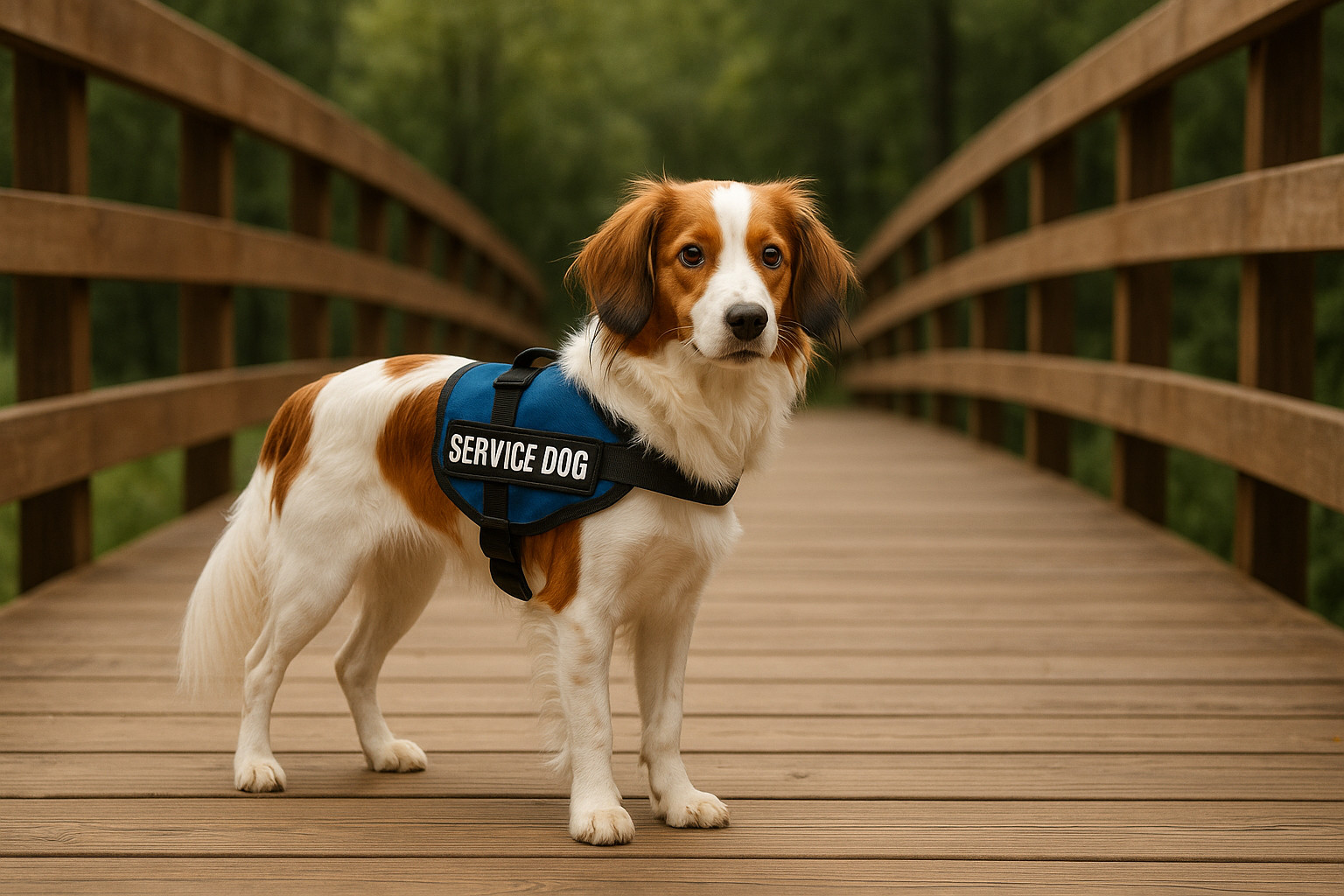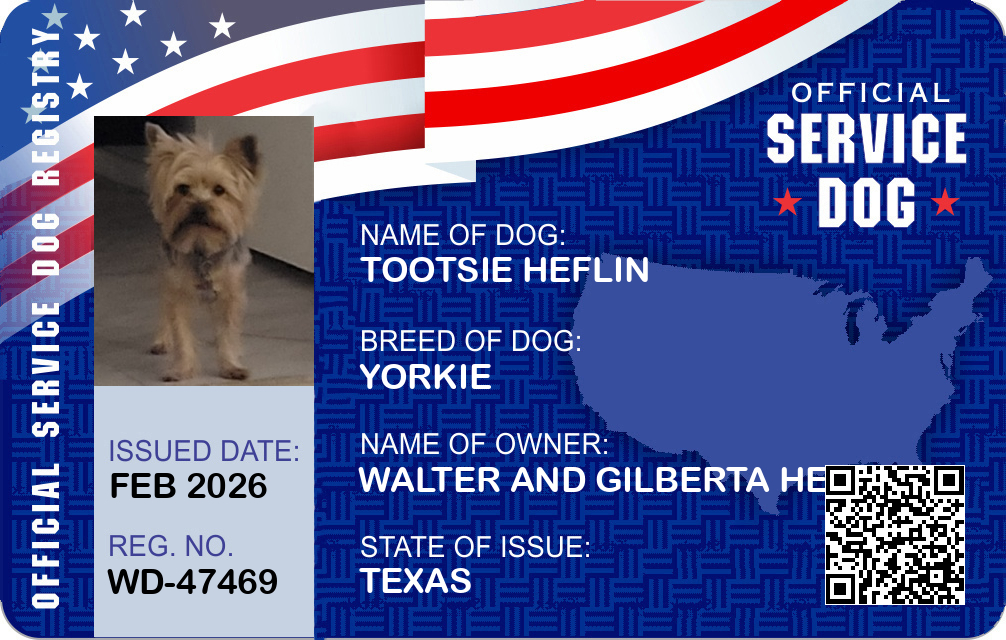Nederlandse Kooikerhondje as a Service Dog
Get Your Documents

Nederlandse Kooikerhondje Overview
The Nederlandse Kooikerhondje, affectionately known as the Kooiker, is a small to medium-sized dog originating from the Netherlands. Traditionally used as a duck decoy dog, these dogs are known for their agility, intelligence, and vibrant energy. While they may not be the first breed that comes to mind when considering service dogs, they possess several qualities that could make them suitable for specific service roles. This article delves into the characteristics and potential of the Kooiker as a service animal, examining their physical attributes, temperament, potential service roles, health considerations, and overall suitability for service work.
Physical Characteristics
The Nederlandse Kooikerhondje is a visually striking breed, characterized by their distinctive orange-red patches on a white coat and their well-feathered ears that sport a unique feature, known as “earrings.” These dogs have a moderately compact and sturdy build, which contributes to their agility and stamina—traits necessary for their historical role in duck decoy work.
The Kooikerhondje typically weighs between 20 to 30 pounds and stands about 14 to 16 inches tall at the shoulder. This size is both an advantage and a limitation in service work. While their relatively small stature allows them to be easily maneuverable in various environments and makes them suitable for individuals needing smaller companions, it may limit their usefulness in tasks that require substantial force or support, such as mobility assistance for individuals who rely on significant weight-bearing support.
Their high energy levels and endurance make them ideal for service roles that require long periods of activity. However, these same attributes necessitate daily physical exercise and mental stimulation to prevent behavioral issues stemming from boredom or excess energy.
Temperament and Attitude
The temperament of the Nederlandse Kooikerhondje is one of their defining traits and significantly influences their suitability as service dogs. Known for their friendly and cheerful disposition, these dogs are generally eager to please and responsive to training. They form strong bonds with their handlers, which is a crucial quality for a working service dog.
Intelligent and alert, Kooikers are adept at picking up new commands and tasks, making them highly trainable. However, they also have an independent streak, which may require experienced handling to ensure consistent obedience, especially in varying public and stressful environments.
In public settings, Kooikers are generally well-behaved and can adapt to different environments provided they are well-socialized from a young age. Their tendency to be protective can be an asset in alert roles but must be managed to prevent unnecessary guarding or anxiety around strangers. A well-socialized Kooiker is typically also good with children and other animals, though they may initially be reserved with new people.
Their sensitive nature means they can be particularly responsive in roles that require an awareness of their handler’s emotional states, such as psychiatric service dogs. However, this sensitivity also means they might be prone to stress or anxiety if not properly acclimatized to their work environment.
Types of Service Work
The Nederlandse Kooikerhondje’s particular set of skills makes them suitable for a selection of service dog roles. However, their smaller size and specific temperament mean they will not be as versatile as larger breeds traditionally employed in service work. Suitable roles include:
- Medical Alert Dogs: Given their attentiveness and bond with their handlers, Kooikers can excel in roles alerting to medical conditions, such as changes in blood sugar levels or impending seizures. Their size does not limit their capability to notify their handlers or fetch necessary medication.
- Psychiatric Service Dogs: The Kooiker’s empathetic nature allows them to sense changes in their handler’s mood or emotional state, making them suitable for psychiatric support, including providing tactile stimulation during anxiety or panic attacks or interrupting self-harm behavior.
- Hearing Dogs: Their alert and responsive nature makes Kooikers suitable as hearing dogs, trained to alert their handlers to important sounds such as doorbells, alarms, or a phone ringing.
- Therapy Dogs: With their friendly demeanor and smaller size, Kooikers are well-suited to therapy work in hospitals or nursing homes, providing comfort and companionship, although this role leans more towards emotional support than traditional service work.
While Kooikers can excel in these roles, it is essential to note that they may not be suitable for tasks requiring physical assistance, such as balance support or guiding individuals with visual impairments, due to their size and strength limitations.
Health Considerations
As with all breeds, the Nederlandse Kooikerhondje has specific health considerations that could impact their ability and tenure as service dogs. Generally, they are a robust and healthy breed but can be prone to certain genetic conditions.
- Patellar Luxation: This condition affects the knee joint and can result in discomfort or lameness, limiting their ability to perform physically demanding tasks.
- Epilepsy: Some Kooikers may be susceptible to epilepsy, which could disqualify them from service roles that require a high degree of reliability and stability.
- Von Willebrand’s Disease: A bleeding disorder that could impact their suitability for certain service roles requiring close interaction with various hazards or environments.
- Eye Conditions: Progressive Retinal Atrophy (PRA) can occur in the breed, leading to blindness over time, which may impact their functionality as a service dog.
Regular health checks, responsible breeding practices, and adequate exercise and diet can help mitigate some health issues, prolonging their service work and ensuring that they remain fit and healthy.
Training and Suitability
Training a Nederlandse Kooikerhondje requires patience, consistency, and a solid understanding of canine behavior. Their intelligence allows them to learn quickly, but their independent streak might lead to selective obedience if not managed correctly. Positive reinforcement is essential for motivating these dogs in a way that builds their confidence and willingness to perform tasks.
The Kooiker’s zeal for work and mental stimulation makes them excel in training scenarios that keep them engaged. Basic obedience should be established early, along with extensive socialization to ensure they are adaptable and calm in different environments. Advanced task-specific training will require an experienced handler or trainer familiar with the breed’s unique traits.
Their suitability as a service dog can be highly individual, hinging on the compatibility between the dog’s temperament, their handler’s needs, and the specific service tasks required. Ideal handlers for Kooikers are those who can offer structured environments with plenty of physical and mental activities, ensuring that the dog remains balanced and content.
Summary of Nederlandse Kooikerhondje
The Nederlandse Kooikerhondje offers a unique blend of attributes for specific service dog roles. Their charm lies in their keen intelligence, affability, and ability to form deep bonds with their handlers. However, their physical constraints and certain breed-specific traits may limit them to specialized service roles.
Summary of Key Strengths and Weaknesses:
- Strengths:
- Highly intelligent and trainable with a quick learning aptitude
- Attentive and responsive, suitable for alert and psychiatric roles
- Good adaptability in various environments due to robust socialization
- Weaknesses:
- Smaller size limits physical service work like mobility assistance
- Independent nature requires experienced handling and consistent training
- Prone to certain genetic health issues which could affect service duration
Ideal Service Roles:
- Medical Alert Dog
- Psychiatric Service Dog
- Hearing Dog
- Therapy and Emotional Support
In conclusion, while the Nederlandse Kooikerhondje may not be the most traditional choice for a service dog, they have a specialized niche that they can fulfill exceptionally well, provided their placement aligns with their unique capabilities and health needs.
Get Your Documents
Example State Cards













